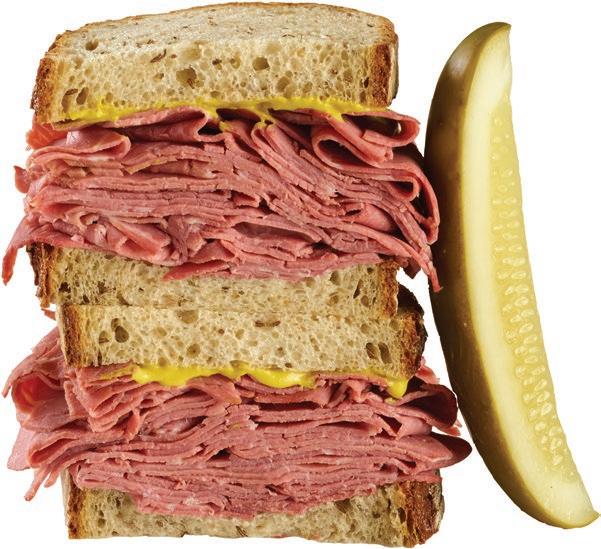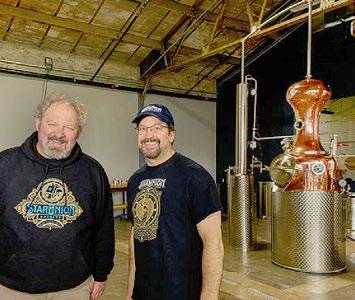
4 minute read
SATISFIED
Another best practice for restaurant operators is understanding the difference between actual inventory and recipe costs. This practice reveals the source of unexpected costs and could create opportunities for savings. The first step is identifying the theoretical food costs as a percentage of total sales. Theoretical food costs are calculated assuming all menu items are made in perfect portion sizes, including no waste, mistakes, or theft. Establishing the menu’s theoretical food cost will provide a blueprint for actual inventory and recipe costs; the theoretical food cost acts as a baseline for production and added costs will cover assumed waste, mistakes, theft, and going over in set portion size.
Once the restaurant’s food prices are understood and tracked accordingly, the next step is ensuring menu pricing is aligned with food costs in mind. For healthy margins, restaurants should aim to keep food cost percentage around 28 –32%. Percentages will differ between the type of restaurant, such as quick service or fine dining, as well as location and hours of operation (i.e.: only open for breakfast and lunch, etc.).
— Find the
Apple
Chicago Cake Decorator Wins Amazon Baking Contest
Bittersweet Pastry’s Kerrie Breuer Wins Amazon Prime’s Dr. Seuss Baking Challenge. Kerrie (pictured on the left), along with her teammate battled through eight episodes and nine teams of America’s best bakers to take home the grand prize of $50,000. Kerrie was born in Seoul and at 6 years old, was adopted into a family of 11. She was born with one hand, but that never stopped her from fulfilling her goals. After attending The French Pastry School, she has worked her way up the ranks to become the Lead Cake Decorator at Bittersweet Pastry Shop in Chicago
Subway Considers Sale

Subway is considering a sale of its business, according to a report in The Wall Street Journal. The privately owned brand is in the early stages of attracting corporate buyers and private equity firms, according to sources. The brand is estimated at more than $10 billion. “As a privately held company, we don’t comment on ownership structure and business plans,” Reuters said a company spokesperson told it in an emailed statement. Subway has more than 37,000 units in more than 100 countries. It’s currently owned by its two founding families.

– Source: qsrweb.com
Cary Miller Presents: PEOPLE SELLING THE FOOD INDUSTRY

This month I am very proud to be pictured with Carmella Muhammad, a gifted chef and owner of Let’s Eat To Live Restaurant located 621 E. 67th St., in Chicago. The restaurant is adorned with artwork created by local artists which enhances the dining experience. Carmella’s goal is to serve healthy food to the community at reasonable prices, and she achieves this every day. Be sure to visit her restaurant and be sure to try their signature Turkey Burger!

Dean Depaoli is the director of Sales & Marketing for Pastorelli Food Products, one of the shining stars of Chicago’s food industry. The Pastorelli family of all natural foodservice and retail products include their famous Pizza Sauce, tomato products, oils, vinegars and pizza crusts. The company’s heritage reaches back to mid-1800’s, when Amedeo Pastorelli founded a food distribution business near Rome Italy. Continuing that tradition, the family then became partners in one of the first tomato canning operations in California, facilitated North America’s first crushing of olives to make olive oil, and became the first company to create and introduce fully prepared pizza sauce in 1952. Five generations later, the Pastorelli family fosters innovation in the heart of downtown Chicago, where they’ve been manufacturing high-quality foods for more than 70 years. You can see their ad on page 27 of this issue.
Thomas Sadowski and Tony Herman are with Smithfield, a company that studies local and global trends to help their customers to prosper. From the bacon or sausage sizzling on your stove, to your favorite ham, ribs, or lunchmeat, chances are good you already love and use some of their leading brands. All Smithfield’s brands include a few simple, high-quality ingredients in every bite – great taste, reasonable prices, and a trustworthy reputation. It’s why millions of chefs and buyers all over the world use and enjoy them every day. You can find Smithfield in our directory under “Meat Products”.

Ted Costianis is one of the important family members owning and operating Chicago based Tec Coffee & Foods, which is one of our country’s leading manufacturer and distributor of Pancake Mix , spices, bases, dressings, syrups, sauces and small batch fresh roasted coffee. Founded in 1973, the company has gained a loyal following of chefs, upscale operations and family restaurants who know that quality and value is what matters most. The company operates two distribution warehouses in Chicago and Milwaukee, and provides direct route sales and service to their accounts. Tec’s products are also sold in over 20 states, and in Canada through broad line distributors. You can see the Tec Coffee & Foods ad on page 28 of this issue.
Business partners Marylou Linares, and Christian Ortiz are Certified Public Accountants at Linares & Associates, a local accounting firm specializing in serving small businesses and individuals with their accounting and income tax needs. The firm can act as a sound advisor to assist in business decisionts as well as financial accounting and income tax preparation. The team also has experience in assisting troubled businesses and their counsel before or after bankruptcy, offering management advice to increase accounting efficiencies and review of internal control procedures. The company is based in North Riverside, Illinois.

Jeff Yosowitz and Bob Windy are partners in Star Union Spirits. Established in 2016 in Peru, Illinois and operating out of the historic Westclox factory, Star Union Spirits is inventive in that “can-do” Midwestern way, reinvigorating the art of specialty craft spirits. Star Union Spirits is excited to offer hand-crafted artisan spirits that are locally made. As consumer spending habits shift away from the white spirits to dark flavored liquids like whiskey and cognac, Star Union Spirits is providing the American answer to the French staple in the form of New American Brandy and other spirits. Be sure to consider placing some of their product behind your bar.











